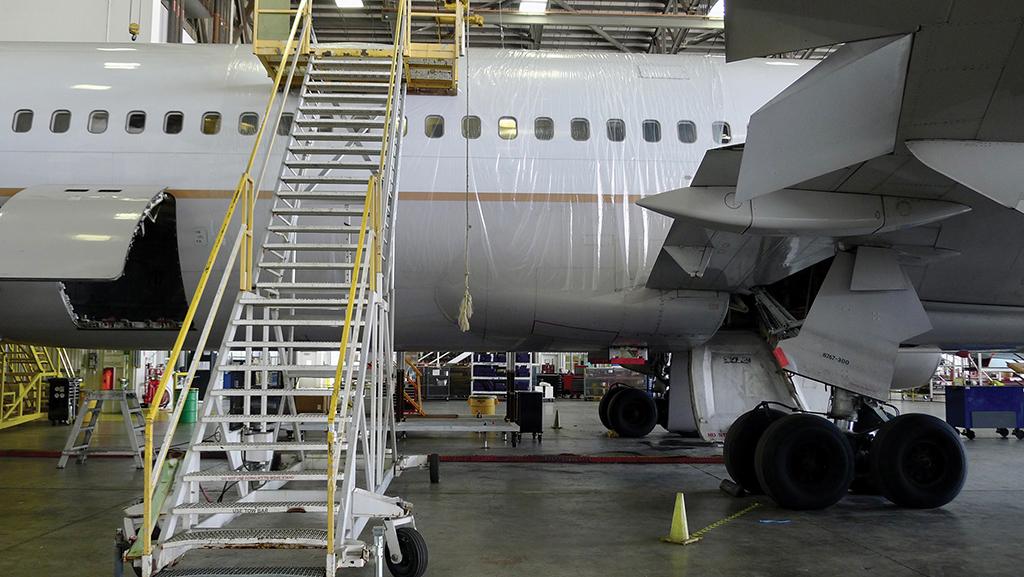
U.S. repair stations are not covered by the pending safety management system mandate.
A pending FAA proposal to expand organization-wide safety management programs beyond airlines does not include mandating them for repair stations. But the discussion is far from over as to whether to require U.S.-certified MRO shops to have a safety management system as do airlines, major manufacturers, some Part 135 charter operators and most air carrier airports.
The January proposed rule affecting manufacturers and tour operators includes an FAA request for industry input on whether repair stations certified under Part 145 should have a safety management system (SMS). The NTSB has weighed in, reiterating its stance that SMS requirements should cover repair stations as well.
In comments filed on the FAA’s proposal, the NTSB points to its probe of an October 2019 fatal accident involving a PenAir Saab 2000 as evidence that certified MRO shops should have SMS. The investigation found four instances in which commercial aircraft anti-skid systems were cross-wired during maintenance, leading to in-service occurrences. Recommendations prompted by investigators’ findings focused on the cross-wiring issue as well as the broader benefit that SMS would have for Part 145s.
“We believe that SMS requirements should be applied to Part 145 repair stations to address [issues highlighted in the PenAir report],” the NTSB wrote in its comments.
The FAA has been rolling out SMS mandates for a decade—and considering whether repair stations need them for just as long. The SMS rules generally follow recommendations made by an industry advisory committee formed in 2009. The group recommended SMS for certain commercial airlines, charter operators and repair stations. It also urged the FAA to prioritize the segments where SMS would generate the most valuable results. That led to a 2015 rule for Part 121 operators and the recent proposal covering Part 21 and certain Part 135 certificate holders. The FAA considered adding mandates to cover some of the 5,000 certified Part 145s as well, but opted to ask industry for input first.
The FAA’s SMS rollout has come with voluntary programs that many companies adopted in advance of mandates. According to the agency, 72 repair stations have SMS, and 19 are recognized by the FAA as being “fully functioning,” Acting Administrator Billy Nolen said at the Aeronautical Repair Station Association (ARSA) annual conference in March.
“We are currently considering whether or not SMS will be required for this segment of the industry going forward,” Nolen said. “We’ve asked the public to weigh in on this question . . . and we are looking forward to receiving that feedback before taking next steps.”
The International Civil Aviation Organization integrated SMS into its recommended practices for certificate holders, including repair stations, in 2013. The European Union Aviation Safety Agency expanded its requirements to repair stations with a mandate effective in late 2022.
Despite the absence of a mandate, many repair stations are affected by SMS, including those working for Part 121 operators that have them. Repair station industry representatives, including ARSA, have expressed concern that a broad mandate would lead to challenges in finding systems appropriate for the variety of Part 145s. Many shops are smaller operations, and finding a system that works for them as well as for larger operations could prove taxing for both the FAA and the shops. Scalability of the SMS mandate is one of the major concerns that affected Part 135 operators, notably those with few or even one aircraft and a single pilot.
The agency acknowledged the issue in its request for input.
“Repair stations perform a wide range of repair and maintenance work on an equally wide range of aircraft and components,” the agency said in the draft rule. “Some repair stations do not perform work on aircraft used for passenger-carrying operations. Should the FAA consider applying [SMS requirements] to all certificated Part 145 repair stations? Should applicability be limited to a subset of Part 145 repair stations?”
The FAA is looking to industry for guidance.
